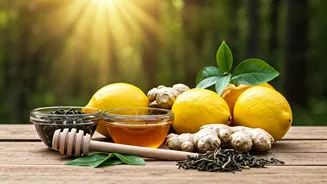Hydrate, Hydrate, Hydrate
Staying hydrated is crucial when fighting off the flu, as it helps thin mucus, allowing for easier breathing and reducing congestion. Water is the most
fundamental source of hydration, but you can also incorporate other liquids. Herbal teas, especially those with soothing properties like chamomile or ginger, offer both hydration and additional benefits. Clear broths, such as chicken or vegetable broth, provide electrolytes lost through fever, vomiting, or diarrhea. Electrolyte-rich drinks, specifically formulated for hydration, may also be helpful, especially if dehydration is severe. Avoid sugary drinks, as these can exacerbate inflammation and may not provide the necessary hydration benefits. Remember to sip frequently throughout the day to keep your body well-hydrated and aid in a quicker recovery.
Honey and Lemon
Honey and lemon is a classic, soothing combination for easing a sore throat and cough, two common symptoms of the flu. Honey acts as a natural cough suppressant and can soothe irritated tissues in the throat. Lemon offers Vitamin C, an antioxidant that boosts your immune system and may help reduce the duration of your illness. To prepare this remedy, mix one to two tablespoons of honey with the juice of half a lemon in a mug of warm water or herbal tea. Stir well and sip slowly. Avoid giving honey to children under one year old due to the risk of botulism. For adults and older children, this simple remedy provides a pleasant and effective way to relieve discomfort and support the body's natural defenses.
Ginger's Antiviral Power
Ginger is a powerful anti-inflammatory and antiviral agent known for its ability to combat flu symptoms like nausea, sore throat, and body aches. The active compounds in ginger, such as gingerol, provide significant health benefits. Ginger can be consumed in various ways: fresh ginger tea, ginger-infused honey, or even ginger supplements. To make ginger tea, simmer a few slices of fresh ginger in hot water for about 10-15 minutes. Strain the tea and add honey and lemon for extra benefits. Ginger helps calm an upset stomach and reduces inflammation, promoting quicker recovery. Its warming properties can also provide comfort and ease congestion. Incorporating ginger into your flu-fighting strategy can provide noticeable relief.
Garlic's Immune Boost
Garlic, with its potent antiviral and antibacterial properties, is a valuable ally in the fight against the flu. The active compound, allicin, is responsible for garlic's immune-boosting effects. When consumed, garlic strengthens the body's ability to fight off infections. While the strong flavor may not be to everyone's liking, the benefits are undeniable. You can incorporate garlic into your diet in various ways. Add fresh garlic to soups, stews, or even take garlic supplements. The key is to consume it regularly to maximize its protective effects. Garlic also helps in reducing the severity and duration of flu symptoms. When feeling unwell, consider adding garlic to your meals or taking supplements to help your body fight the flu effectively.
Rest and Sleep
Rest and sufficient sleep are critical for flu recovery. When you're sick, your body needs extra energy to fight off the infection and repair itself. Sleep allows your immune system to work efficiently. Aim for at least 8 hours of sleep each night. Create a restful environment by keeping your bedroom dark, quiet, and at a comfortable temperature. Avoid screen time and stimulating activities before bed. If you have trouble sleeping, try relaxing activities such as reading or listening to calming music. Adequate rest enables your body to recover faster, reduce symptom severity, and prevent complications. Prioritizing rest is one of the most effective strategies to overcome the flu.















